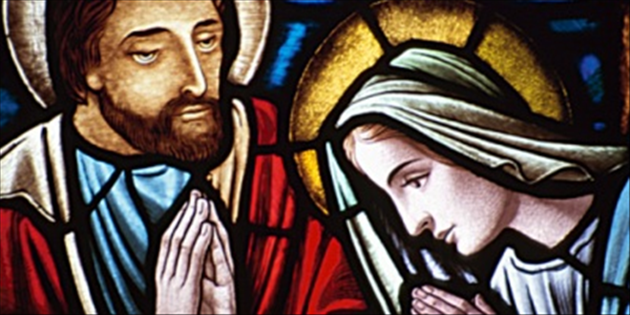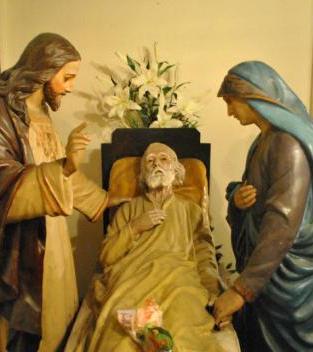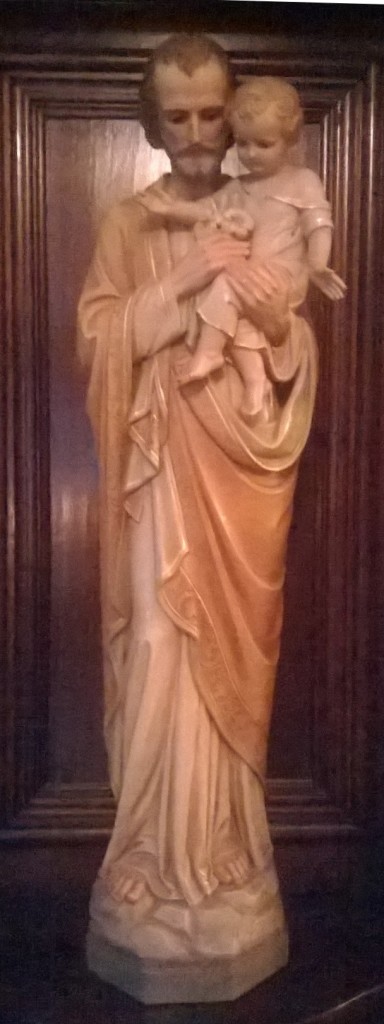In order to receive Mary’s love, in order to receive her who was totally consecrated to God, Joseph must have had to enter into this consecration himself…..When Mary told him about herself, Joseph received her as she was, and, since he loved her, his only desire could have been to live what she lived. When we love someone, we receive what is most secret in that person and we desire to live it too. If it were any other way it would be the proof that we do not really love that person, since love is concerned with what is best, most intimate and most secret in a person. Truly choosing to love someone means loving what is most profound in that person. What was deepest in Mary was that she belonged to God. Joseph therefore chose this out of love for her, and so consecrated himself to God by the very fact that he loved her. —Father Marie-Dominique Philippe ‘The Mystery of St Joseph’
Saint Joseph

…with labour and toil shalt thou eat thereof all the days of thy life.
Saint Joseph shows us the kind of work that God loves: a work that is humble, hidden, fervent and carried out in poverty. He works for the glory of God alone and with the greatest possible gratuity. —Father Marie-Dominique Philippe “The Mystery of St Joseph‘


Balance: work and the religious life
I have been struggling with balance and work. Allowing God to guide into greater understanding, ‘Vainity of vanities’ the first Scriptural reading from Mass arises appropriate–a deeper understanding regarding trust, obedience, and hope amidst a life of toil. The contrasting also of a life of idliness, a life of sloth and delusion, a dillitant effort of doing one’s own thing under the guise of freedom, a wanton exercise of intellectual foolishness. The foregoing of a life of toil in order to pursue pleasure, self-glorifying through an attachment to one’s creative efforts. It is the curse and addiction of many artist. Unable to commit to a life of humble brotherhood and servitude, unable to detach from one’s illusion of being gifted–a source and fountain of God’s wisdom, the solitary idle life of an artist perverts and impedes, demonic in formation as practice and years advance. I think of a clownish friend whose words and unemployed ways alight tainted anymore. Cleverness and brilliance appearing purely vain, in essence an avoiding of a simple, humble, authentic life. To toil is to avoid the excess of living solely for one’s glory. Regarding the opposite extreme, to toil too much, to be overwhelmed by work, exercising work weeks seven days in length, is an exhausting austere vanity depleting mind, body, and spirit of the energy necessary for a healthy spiritual life, as well as a peaceful personal life. Let’s explore thoughts of Father Marie-Dominique Philippe on the mystery of St Joseph and life as a worker.
By not wasting time, by remaining focused on his (St Joseph’s) work, by not being excitable or chatty, nor proud or possessive, Joseph performed his work with love . He thus shows us that the Church began with the sanctification of work.
Saint Joseph is not a saint because he was a good worker who knew how to work well with matter. He is the patron saint of workers because he knew how to rise above not only the concern for efficiency and the need to dominate the matter we work with but also above the joy of a job well done, in order to offer it to God.
He did not work in order to become a specialist, or to win a prize, or again for human glory. He worked for the sole reason that God asked him to; he worked in order to fulfill His will. Obedience to God, and the fact of being predominantly concerned with doing His will, gives gentleness to our work.
We do not waste time, and we work without stress or fuss. We work ardently (with the ardor that comes from adoration) yet without agitation, and joyfully — with the joy of giving all our time to God.
As a “just and God-fearing man,” Joseph knew that, since the Fall, God has asked man to work “by the sweat of [his] brow” for six days of the week, and that work is done in obedience to God, to do His will, to become ever more docile to His Spirit, always accepting that we do not “possess” our work. We are always tempted, in fact, to seek visible success; we are tempted by the human glory of having others look at us and be interested in us, of being famous. However, if we seek the glory that comes from men, then true prayer is completely lost; adoration and contemplation are completely lost. Saint Joseph helps us not to give into the temptation of human glory and any form of worldly Messianism.
This is vital, for herein lies a major obstacle to the beatitude of the poor. “Fear of the Lord is the root of wisdom”; in other words, poverty is that without which there is no contemplation. And without interior poverty there is no longer any real divine hope. We can be certain that Saint Joseph never wasted time and that he detested dilettantism. Wherever we find dilettantism, even in a pious, “baptized”form, there is no place there for Saint Joseph. He himself worked too seriously to fall into that trap. He had the seriousness of a true worker. But the seriousness of a true worker is not the same as a bad mood! On the contrary, the more serious we are about our work the more we are in a good mood. Working seriously puts all our grumpiness to flight. Work, in its realism, and in the intention with which we do it (namely, for God and in order to be united to Him by doing the will of the Father), purifies us. Let us not forget that Jesus did not come to free us from work. Work purifies us: it purifies the intelligence from all that is imaginary, which encumbers us, and it also contributes to the purification of our hearts from the imaginary, and from romanticism. It allows fraternal charity to be incarnated… He who claims to love and does not work does not really love: he remains a dilettante, a romantic. Romantic love is never incarnated —it doesn’t need to be, since it is romantic! Realistic love, on the other hand, needs to be incarnated in some form of work. –Father Marie-Dominique Philippe ‘The Mystery of St Joseph’

Joseph and Mary in love
This is the radical purification
God demands of Joseph’s heart.
His love for Mary
Must be offered to the Father
Only to be fulfilled in accordance with God’s will.
Surely this is what God demands of every human love: that it be supernaturalized through charity, and radically so. However, in Joseph’s case, that which ordinarily is radical and fundamental becomes explicit and present “in act.”In order for him to espouse Mary in truth, he has to live in his heart what she herself lives in relation to her God: the offering of one’s entire life in total surrender. –Father Marie-Dominique Philippe ‘The Mystery of St Joseph’

Mary’s love for Joseph
Mary may well have asked herself all these questions out of love for Joseph, fearing that he himself would be asking questions of this sort. But, in fact, she surrenders herself — in suffering and in sorrow, accepting not to understand — to the Father’s gracious will. Love remains present in her heart, a love full of suffering, grief and anguish, but a love which is victorious over everything. –Father Marie-Dominique Philippe ‘The Mystery of St Joseph’


Servant par excellence
We cannot help but admire the stark simplicity and poverty of Joseph’s end. We know where the patriarchs were buried: Scripture tells us the resting places of Abraham, Isaac and Jacob… We are told nothing about Joseph: no trace of him remains on earth. On account of this silence some claim that he was taken up into Heaven. Yet we can interpret this silence in a different way and understand that it helps us to discover Joseph’s spiritual poverty —the poverty of this father who exercised so unique an authority and who is truly the servant par excellence —the servant of the New Covenant, gentle and faithful but dispensable. – – Father Marie-Dominique Philippe ‘The Mystery of St Joseph


Reinvigoration
There are two limits to human attention: that of the man who falls asleep, yielding himself to the biological wisdom hidden in the innermost recesses of his being and which alone can restore him in depth; and that of the man who touches the edges of ‘ecstasy’ because he has caught a glimpse of beauty, of love, of true prayer. When man forgets himself to become attention, this other mysterious being, “the Holy Spirit, intercedes with sights too deep for words, praying for what man does not know how to ask” as the Apostle says. –Andrew Doze “Saint Joseph Shadow of the Father”

St Joseph, dally greeter


Recent Comments